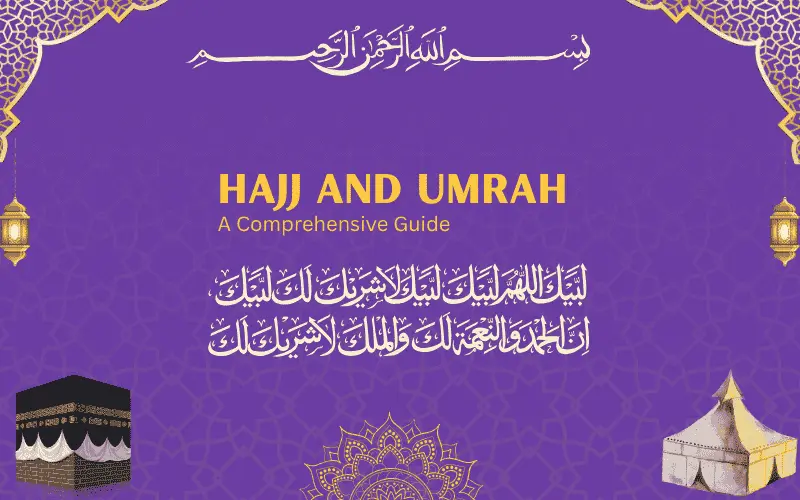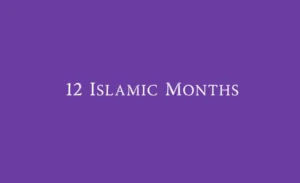For millions of Muslims around the world, visiting the holy city of Makkah to perform Hajj or Umrah is a deeply spiritual milestone and a powerful act of devotion. While both are sacred forms of pilgrimage in Islam and share some rituals, they differ significantly in timing, obligation, spiritual rank, and procedures. Understanding these differences is essential not only for fulfilling religious duties correctly but also for appreciating the unique rewards and meanings behind each journey.
In this comprehensive guide, we will explore the 10 key differences between Hajj and Umrah, supported by authentic Qur’anic verses, Hadith, Arabic references with English translations, and practical insights to help every Muslim prepare spiritually and practically for these life-changing acts of worship.
What Is Hajj?
Hajj (Arabic: الحج) is the major pilgrimage to Makkah, performed once a year during Dhul-Hijjah (the 12th month of the Islamic calendar). It is one of the Five Pillars of Islam and is obligatory once in a lifetime for every adult Muslim who is physically and financially able.
Qur’anic Reference
وَلِلَّهِ عَلَى النَّاسِ حِجُّ الْبَيْتِ مَنِ اسْتَطَاعَ إِلَيْهِ سَبِيلًا
Transliteration: Wa lillahi ‘alan-naasi hijjul-baiti manis-tataa’a ilaihi sabeela
Translation: “And Hajj (pilgrimage) to the House is a duty owed to Allah by all people who are able to make the journey.” – (Surah Aal-Imran, 3:97)
This highlights the obligatory nature of Hajj in Islam. Allah ﷻ commands that performing Hajj to the Kaaba, His sacred house in Makkah, is a duty upon all believers who possess the physical and financial ability to undertake the journey. This verse firmly establishes Hajj as one of the Five Pillars of Islam, making it not just a spiritual recommendation, but a divine obligation for those who are capable.
It underscores the importance of fulfilling this duty with sincerity and preparation, reminding the ummah that pilgrimage is not merely a ritual but a profound expression of submission, humility, and unity before Allah. Through this command, believers are called to respond to Allah’s invitation, to cleanse their souls, and to walk in the footsteps of Prophet Ibrahim (AS) in devotion and obedience.
What Is Umrah?
Umrah (Arabic: العمرة) is a non-mandatory, yet highly recommended pilgrimage to Makkah. Unlike Hajj, it can be performed at any time of the year and is often referred to as the ‘lesser pilgrimage’.
Hadith Reference
الْعُمْرَةُ إِلَى الْعُمْرَةِ كَفَّارَةٌ لِمَا بَيْنَهُمَا
Transliteration: Al-‘umratu ilal-‘umrah kafāratun limā baynahumā
Translation: “Umrah to Umrah is an expiation for the sins committed between them.” – (Sahih al-Bukhari, Hadith 1773)
These profound words of the Prophet ﷺ reveal the immense mercy and reward embedded in the act of performing Umrah. This Hadith, recorded in Sahih al-Bukhari (Hadith 1773), teaches us that each Umrah serves as a purification, wiping away the sins committed between one Umrah and the next. It illustrates how Allah ﷻ, in His infinite mercy, offers repeated opportunities for believers to cleanse their hearts and renew their connection with Him.
Unlike Hajj, which is obligatory once in a lifetime, Umrah can be performed multiple times, and with every sincere effort, a Muslim is given the chance to emerge spiritually refreshed and forgiven. This Hadith encourages us to seek Allah’s forgiveness continually, and to never underestimate the power of sincere worship, even in shorter acts like Umrah, to transform our spiritual lives.
10 Differences Between Hajj and Umrah
The major Differences Between Hajj and Umrah highlight the key distinctions between Islam’s two sacred pilgrimages. While both involve visiting the Holy Kaaba, Hajj is obligatory and time-bound, whereas Umrah is voluntary and can be performed year-round. Understanding these differences helps Muslims fulfill each act with the correct intention and knowledge. Below is a breakdown table to help you better understand the differences:
| # | Feature | Hajj | Umrah |
| 1. | Obligation | Mandatory (once in a lifetime) | Voluntary |
| 2. | Timing | Fixed dates (8th to 13th Dhul-Hijjah) | Any time of the year |
| 3. | Duration | 5 to 6 days | 2 to 4 hours |
| 4. | Pillars | Ihram, Tawaf, Sa’i, Arafah, Mina, Muzdalifah, Rami, Qurbani | Ihram, Tawaf, Sa’i |
| 5. | Spiritual Significance | One of the 5 Pillars of Islam | Sunnah act of high reward |
| 6. | Location Specifics | Includes multiple sites: Mina, Arafah, Muzdalifah | Limited to Haram of Makkah |
| 7. | Hady (Sacrifice) | Required | Not required |
| 8. | Ihram Restrictions | More extensive and longer-lasting | Shorter and less restrictive |
| 9. | Gender Companionship Rules | Stricter due to length and scope | More flexible (though a mahram is still needed for women) |
| 10. | Repetition | Once in a lifetime, if able | Can be performed multiple times |
Similarities Between Hajj and Umrah
Despite their differences, Hajj and Umrah share several core rituals and spiritual purposes. Both require entering the state of Ihram, performing Tawaf around the Kaaba, and walking between Safa and Marwah (Sa’i). Each journey serves as a means of drawing closer to Allah ﷻ and seeking His mercy and forgiveness. Below are some similarities:
- Both require entering the Ihram.
- Both involve performing Tawaf around the Ka’bah.
- Both include Sa’i (walking between Safa and Marwah).
- Both are acts of great spiritual reward.
- Both can only be performed in Makkah.
Who Should Perform Hajj or Umrah?
Hajj is obligatory once in a lifetime for every adult Muslim who is physically and financially capable, while Umrah is a recommended Sunnah that can be performed anytime. Both are acts of devotion meant for those who meet the Islamic conditions of accountability, ability, and intention.
Hajj is obligatory for:
- Muslim
- Adult
- Sane
- Financially able
- Physically capable
- Free (not enslaved)
Umrah is not obligatory, but highly encouraged for anyone who meets the same conditions.
Hadiths Highlighting the Importance of Hajj and Umrah
Several authentic Hadiths emphasize the immense spiritual rewards of performing Hajj and Umrah. The Prophet ﷺ described Hajj as a means of complete forgiveness, and Umrah as an expiation for sins committed between two performances. These teachings highlight the mercy of Allah and the transformative power of both pilgrimages.
On Hajj
مَنْ حَجَّ لِلَّهِ، فَلَمْ يَرْفُثْ، وَلَمْ يَفْسُقْ، رَجَعَ كَيَوْمِ وَلَدَتْهُ أُمُّهُ
Transliteration: Man hajja lillāhi fa lam yarfuth wa lam yafsuq, raja‘a ka yawmi waladathu ummuh
Translation: “Whoever performs Hajj for the sake of Allah and does not commit any obscenity or wrongdoing shall return as free of sin as the day his mother bore him.” – (Sahih al-Bukhari, Hadith 1521)
This beautiful Hadith of the Prophet ﷺ found in Sahih al-Bukhari (Hadith 1521), powerfully illustrates the purifying nature of a sincere Hajj. It teaches that if one performs Hajj solely for the sake of Allah, avoiding immoral speech and sinful behavior, they will return home completely cleansed of sin, just like a newborn child. This highlights not only the immense reward of Hajj, but also the importance of intention, conduct, and spiritual discipline during the pilgrimage. Hajj, therefore, is not just a journey of the body but a profound renewal of the soul.
On Umrah
الْحُجَّاجُ وَالْعُمَّارُ وَفْدُ اللَّهِ
Transliteration: Al-hujjāj wa al-‘ummār wafdullāh
Translation: “The pilgrims performing Hajj and Umrah are the guests of Allah.” – (Sunan Ibn Majah, Hadith 2892)
The Hadith from Sunan Ibn Majah (Hadith 2892) beautifully describes those performing Hajj and Umrah as the guests of Allah. This powerful metaphor signifies the honor, closeness, and special status granted to pilgrims by their Lord. Just as a generous host honors and provides for their guests, Allah ﷻ bestows immense mercy, blessings, and forgiveness upon those who travel to His Sacred House with sincerity and devotion. Being called “wafdullah” is a reminder that the journey of Hajj and Umrah is not merely a physical visit but a divine invitation and a moment of intimate nearness to the Creator.
Important Surahs for Pilgrimage Reflection
Several Surahs in the Qur’an offer deep reflection on the rituals and meaning of pilgrimage. Some Surahs from the Quran provide divine guidance on Hajj, its purpose, and its connection to Prophet Ibrahim (AS). These verses enrich the pilgrim’s spiritual understanding and intention. Below is a brief list:
- Surah Al-Hajj (22) – Dedicated entirely to pilgrimage laws and spiritual lessons.
- Surah Al-Baqarah (2:196–203) – Details of Hajj rituals.
- Surah Aal-Imran (3:96–97) – Significance of the Kaaba and obligation of Hajj.
May Allah Accept Your Intentions for Hajj or Umrah
Both Hajj and Umrah are sacred journeys that bring a Muslim closer to Allah (SWT). While Hajj is obligatory, Umrah is a beautiful Sunnah that wipes away sins and draws countless rewards. Understanding their differences and spiritual importance helps Muslims better prepare for these holy experiences.
Planning to perform Hajj or Umrah soon? Bookmark this guide and share it with fellow Muslims seeking clarity. May Allah accept your intentions and grant you the means to visit His House!






